Top 10 Most Corrupt U.S. Presidents
The question of who are the most corrupt U.S. Presidents opens up a fascinating dialogue about the intertwining of political power and personal ethics. It allows us to explore the gray area between leadership and manipulation, between serving the nation and serving oneself.This isn't about clear-cut villainy; this is about shades of grey and questionable decisions. It's about understanding that power can sometimes lead even the best of us astray.
In this context, corruption is a multifaceted concept that encompasses a wide range of questionable actions and behaviors. It could be financial graft, political manipulation, abuse of power, or even actions that undermined the values and principles the U.S. holds dear.
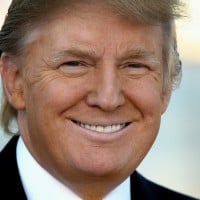 His presidency has been marked by allegations of emoluments clause violations and the blurring of lines between his business interests and presidential duties. Some critics have accused him of using the presidency to benefit his own enterprises, a clear example of political corruption that undermines the trust in the democratic institution.
His presidency has been marked by allegations of emoluments clause violations and the blurring of lines between his business interests and presidential duties. Some critics have accused him of using the presidency to benefit his own enterprises, a clear example of political corruption that undermines the trust in the democratic institution. Trump totally deserves this. When he was President, all the bad stuff happened: COVID hit, America went down, and so much more. When Biden became President, Trump was being childish and could not attend the ceremony because he had too much pride. He was probably throwing a fit in his room. None of the Presidents are perfect, but Trump is probably the most corrupt.
The only swamp that is draining is his own kingdom. Members of his staff who have morals are running from this President. Teflon Don surrounds himself with a pack of lawyers, and every day since he has been in office, there has been drama. No different than popular gangsters who exercise their power, legitimate or not, including tax evasion. The very same corruption Rudy fought against as prosecutor and mayor of NYC.
Republicans say they are picking on him since his election. They forgot the roadblocks they put President Obama through, beginning his first day in office. They forgot how President Clinton's poor discretion and lie was merely a "cleansing of the White House."
Trump lies every day but is smart enough never to testify, always finding a diversion. The way he addresses the nation, I often wonder if his dad paid to get him into college and adjust his SAT scores. If so, that would be "very, very bad."
Any government employee would be fired for less ethical infractions.
 Critics argue that the administration's "Fast and Furious" gun-walking scandal represented a deeply entrenched form of bureaucratic corruption. The handling of this operation, which allegedly allowed firearms to flow into the hands of Mexican drug cartels, was seen as an abuse of executive power that cost lives.
Critics argue that the administration's "Fast and Furious" gun-walking scandal represented a deeply entrenched form of bureaucratic corruption. The handling of this operation, which allegedly allowed firearms to flow into the hands of Mexican drug cartels, was seen as an abuse of executive power that cost lives. Money from programs he initiated went to ISIS via Saudi Arabia, and weapons purchased by American taxpayers from programs he initiated were sent to ISIS via Eastern Europe. At a time when ISIS was slaughtering and raping anybody who wasn't them, he and his government knowingly initiated programs to assist them, all because they wanted to be friendly to Saudi Arabia and Turkey, which countless government reports show have been allied to this terrorist network. He put his fingers deep into this attack on the civilized world. It makes the corruption in Chicago of rigged elections pale in comparison.
 Criticism has been directed at his handling of his son's overseas business dealings. Critics argue that these dealings represent a conflict of interest and potential corruption, questioning whether decisions may have been influenced by these ties.
Criticism has been directed at his handling of his son's overseas business dealings. Critics argue that these dealings represent a conflict of interest and potential corruption, questioning whether decisions may have been influenced by these ties. Biden has reached a new low. His corruption has become more blatantly obvious. He was caught on a tape discussing bombing Ukraine and magically deflected another major story that should have been taken seriously. Instead, he turned that around to target Trump once again, for no legitimate reason other than to generate negative press about his opponent. It is an abuse of power.
What an absolute disaster this guy has been. Our service members died during a hasty withdrawal from Afghanistan where they were only given 18 days to exit, leaving billions in military hardware to our enemies. Failed economic and energy policies. Rampant inflation.
He emptied our strategic oil reserves with no plan to refill them just to artificially keep gas prices low. Corrupt business deals overseas with his son. Hiding classified documents that he himself called 'irresponsible' when Trump had some declassified documents found in Florida.
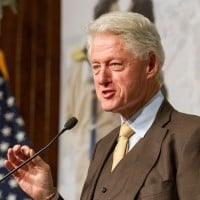 The infamous Monica Lewinsky scandal, coupled with allegations of perjury and obstruction of justice, were indicative of personal corruption in the Oval Office. These controversies stained his presidency and eroded public faith in his leadership.
The infamous Monica Lewinsky scandal, coupled with allegations of perjury and obstruction of justice, were indicative of personal corruption in the Oval Office. These controversies stained his presidency and eroded public faith in his leadership. Beginning with their allegiance to China's spy ring that facilitated nuclear secrets and embedded Chinese spies in every level of corporate and government agencies and Democrat senator offices.
Though he was found to be a promiscuous President, he was not found guilty of any financial mishandling. He was one of the greatest Presidents in terms of financial soundness, as he was the first to balance the national debt through bipartisan cooperation. Though promiscuous, he was only found guilty and impeached for lying to a Congressional Committee about inappropriate acts. By most Americans' counts, he profited from a global warming scandal.
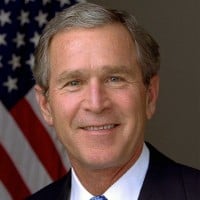 The Iraq War and the false allegations of weapons of mass destruction have been criticized as an example of political corruption, a calculated misinformation campaign that led to war. Such actions not only deceived the American public but also destabilized a region, with repercussions still felt today.
The Iraq War and the false allegations of weapons of mass destruction have been criticized as an example of political corruption, a calculated misinformation campaign that led to war. Such actions not only deceived the American public but also destabilized a region, with repercussions still felt today. A fool who lined his family's wealth following his dad's efforts as the chief spy of the CIA.
Too much into globalism and not American sovereignty. So sorry I ever voted for him.
Number 1 worst human being in the world. Number 1 mistake.
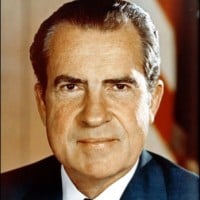 The Watergate scandal stands as the epitome of presidential corruption, leading to his resignation. Nixon's abuse of power, the illegal activities he sanctioned, and the subsequent cover-up demonstrated a disregard for the rule of law, undermining the public trust in the highest office.
The Watergate scandal stands as the epitome of presidential corruption, leading to his resignation. Nixon's abuse of power, the illegal activities he sanctioned, and the subsequent cover-up demonstrated a disregard for the rule of law, undermining the public trust in the highest office. He makes the list for initiating a new level of corrupt abuse of governmental agencies. Those after him have since legitimized and exported these abuses to other countries.
Only found incompetent during the Watergate Scandal, which was an election spy operation that utilized government agencies. These agencies are still in use today by current presidents.
Really, the gold standard of corruption in office. Until Trump. In retrospect, Nixon was merely Trump Lite.
 The Iran-Contra affair marred Reagan's presidency. The secretive and illegal sale of arms to Iran, with funds diverted to Nicaraguan Contras, was a stark example of corruption, an abuse of power that undermined the legislative oversight of executive action.
The Iran-Contra affair marred Reagan's presidency. The secretive and illegal sale of arms to Iran, with funds diverted to Nicaraguan Contras, was a stark example of corruption, an abuse of power that undermined the legislative oversight of executive action. Reagan was responsible for the deaths of tens of thousands, personally extended and expanded the AIDS epidemic, and committed treason many times, the worst being arming Iran and replacing democratically elected governments with criminals all over the planet. He gets my vote.
More of a figurehead than a leader, Reagan's time in office was marked by repeated scandals, a corrupt Attorney General named Edwin Meese, and a domineering wife who based her decisions on US policy on the soothsaying of mediums.
The War on Drugs was a sham designed to privatize prisons and disproportionately incarcerate people of color. He was a hypocrite Doctor Demento.
 The manipulation of information regarding the Gulf of Tonkin incident, which escalated U.S. involvement in the Vietnam War, is often seen as a glaring example of political corruption. The alleged deception of Congress and the public has been considered an abuse of presidential power.
The manipulation of information regarding the Gulf of Tonkin incident, which escalated U.S. involvement in the Vietnam War, is often seen as a glaring example of political corruption. The alleged deception of Congress and the public has been considered an abuse of presidential power. He lied about Vietnam War involvement in the beginning to justify US involvement and had ties to companies that profited from construction work on military bases in-country.
This guy was the architect of the JFK assassination just so he could become President and pander to the military-industrial complex by vastly increasing the American presence in Vietnam. He was one of the least trustworthy people, after Trump, to ever sit in the Oval Office.
He pushed America into the Vietnam War and profited from the "War Machine," like many Presidents after him, killing almost millions of American and other national men and women during the conflict.
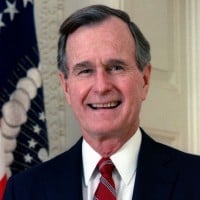 The Iran-Contra affair, which began during the Reagan administration, also tainted Bush's presidency due to his involvement as Vice President. Critics argue that this scandal illustrated a deep-seated corruption within the executive branch, undermining the integrity of the office.
The Iran-Contra affair, which began during the Reagan administration, also tainted Bush's presidency due to his involvement as Vice President. Critics argue that this scandal illustrated a deep-seated corruption within the executive branch, undermining the integrity of the office. He was the first architect of the Conspiracy of the New World Order (NWO) and allegedly made billions, if not trillions, on arms deals and oil companies that he owned.
A fool played by neocon warmongers at the expense of Americans' rights and freedoms.
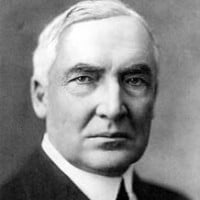 The Teapot Dome scandal, where his Secretary of the Interior leased Navy petroleum reserves in exchange for bribes, remains a notorious instance of corruption. This abuse of public resources for private gain under Harding's watch cast a long shadow over his presidency.
The Teapot Dome scandal, where his Secretary of the Interior leased Navy petroleum reserves in exchange for bribes, remains a notorious instance of corruption. This abuse of public resources for private gain under Harding's watch cast a long shadow over his presidency. The fact that this guy isn't top 3 shows how biased we are both for and against recent leaders.
He got away with the Teapot Dome scandal, but others went to prison.
He was the swamp - selling business connections to enrich himself.
The Newcomers
 Gerald Rudolph Ford Jr. was an American politician who served as the 38th President of the United States from August 1974 to January 1977.
Gerald Rudolph Ford Jr. was an American politician who served as the 38th President of the United States from August 1974 to January 1977.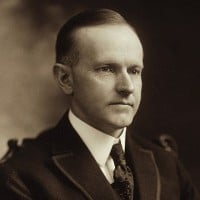 John Calvin Coolidge Jr. was an American politician and the 30th President of the United States. A Republican lawyer from New England, born in Vermont, Coolidge worked his way up the ladder of Massachusetts state politics, eventually becoming governor.
John Calvin Coolidge Jr. was an American politician and the 30th President of the United States. A Republican lawyer from New England, born in Vermont, Coolidge worked his way up the ladder of Massachusetts state politics, eventually becoming governor. His administration's implementation of racial segregation within federal agencies has been criticized as an act of institutional corruption. This regressive policy not only entrenched systemic racism but also contradicted the principles of democracy he espoused.
His administration's implementation of racial segregation within federal agencies has been criticized as an act of institutional corruption. This regressive policy not only entrenched systemic racism but also contradicted the principles of democracy he espoused. The corruption is more on the part of Edith Wilson for acting as President by obfuscating the fact that Woodrow Wilson was incapacitated by a stroke, even to his close aides. This effectively denied Vice President Tom Marshall from becoming the president, as is the constitutional protocol. Woodrow's complicity extends to his hiding of his health issues, including a number of strokes prior to his presidency.
The worst political traitor to American principles of all time due to his support for the Federal Reserve and the wealthiest individuals.
 His disregard for the Tenure of Office Act, which led to his impeachment, is an example of executive overreach. Johnson's actions represented a breach of constitutional norms, an act of corruption that undermined the balance of power in the U.S. government.
His disregard for the Tenure of Office Act, which led to his impeachment, is an example of executive overreach. Johnson's actions represented a breach of constitutional norms, an act of corruption that undermined the balance of power in the U.S. government. A Democrat who worked to sabotage Lincoln's Reconstruction of the South and integration of Black Freedmen into American society. He opposed the 13th, 14th, and 15th amendments, which ended slavery, extended citizenship, and gave the vote to Black freedmen in the South. He looked the other way when early KKK terrorists murdered Black and White Republicans until Grant sent troops into the South to stop it.
Messed up African American rights for years to come. One of the main factors for segregation.
Sinks to #2 after Trump, who will easily be #1 as most corrupt.
 His policy of Indian Removal, often viewed as ethnocentric and exploitative, has been criticized as a morally corrupt abuse of power. The forced displacement of Native American tribes for land interests represented a dehumanizing act of state corruption.
His policy of Indian Removal, often viewed as ethnocentric and exploitative, has been criticized as a morally corrupt abuse of power. The forced displacement of Native American tribes for land interests represented a dehumanizing act of state corruption. Slaughtered Native American men, women, and children without remorse.
 Widely criticized for his role in the lead-up to the Civil War, Buchanan's indecisiveness and inaction on the issue of slavery have been seen as a form of moral corruption. His failure to confront and resolve this grave issue represented a profound neglect of presidential duty.
Widely criticized for his role in the lead-up to the Civil War, Buchanan's indecisiveness and inaction on the issue of slavery have been seen as a form of moral corruption. His failure to confront and resolve this grave issue represented a profound neglect of presidential duty. He literally did nothing to stop the Civil War.
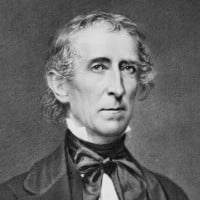 His annexation of Texas, pursued without clear Congressional approval, has been criticized as an example of executive overreach. This act of political corruption upset the balance of power between the branches of government and heightened sectional tensions.
His annexation of Texas, pursued without clear Congressional approval, has been criticized as an example of executive overreach. This act of political corruption upset the balance of power between the branches of government and heightened sectional tensions.
 His administration's mishandling of the onset of the Great Depression, along with the perception that he favored big business interests, led to accusations of economic corruption. Critics argue that these decisions worsened the financial crisis for many Americans.
His administration's mishandling of the onset of the Great Depression, along with the perception that he favored big business interests, led to accusations of economic corruption. Critics argue that these decisions worsened the financial crisis for many Americans.
 John Adams was born on October 30, 1735 in Quincy, Massachusetts, United States. Adams served as the president of the United States from March 4, 1797 to March 4, 1801. He died on July 4, 1826 at the age of 90.
John Adams was born on October 30, 1735 in Quincy, Massachusetts, United States. Adams served as the president of the United States from March 4, 1797 to March 4, 1801. He died on July 4, 1826 at the age of 90. While Carter's personal integrity is often praised, his administration's handling of the Iran hostage crisis was criticized as demonstrating a lack of effective leadership. This perceived inability to resolve the crisis could be seen as a form of corruption of the presidential mandate.
While Carter's personal integrity is often praised, his administration's handling of the Iran hostage crisis was criticized as demonstrating a lack of effective leadership. This perceived inability to resolve the crisis could be seen as a form of corruption of the presidential mandate. This was a nice man, but he was not presidential in the least. He self-describes how he was just a family man and a good Christian.
An idiot who should never have been President. Double-digit inflation and high unemployment displayed his total incompetence as a leader.
Not really corrupt by comparison to most. It may be that his total incompetence is being confused with corruption. He was simply unable to do the job.
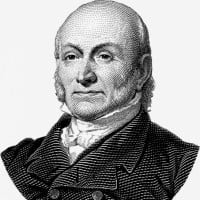 The 1824 election, referred to as the "Corrupt Bargain," has been viewed as a form of political corruption. Adams, who won the presidency despite not securing the popular or electoral majority, was accused of striking a deal with Henry Clay, leading to a widespread public outcry.
The 1824 election, referred to as the "Corrupt Bargain," has been viewed as a form of political corruption. Adams, who won the presidency despite not securing the popular or electoral majority, was accused of striking a deal with Henry Clay, leading to a widespread public outcry.
 His presidency was marred by multiple scandals, such as the Whiskey Ring, where government officials were creating fraudulent tax reports. Although Grant wasn't directly implicated, the pervasive corruption within his administration undermined public trust in government.
His presidency was marred by multiple scandals, such as the Whiskey Ring, where government officials were creating fraudulent tax reports. Although Grant wasn't directly implicated, the pervasive corruption within his administration undermined public trust in government. He is second, but incredibly better than number one.
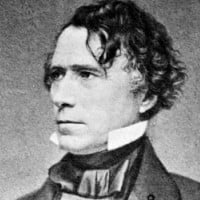 His support for the Kansas-Nebraska Act, which exacerbated sectional tensions over slavery, can be seen as a form of moral corruption. Pierce's decision arguably put political expediency over human rights and paved the way for the Civil War.
His support for the Kansas-Nebraska Act, which exacerbated sectional tensions over slavery, can be seen as a form of moral corruption. Pierce's decision arguably put political expediency over human rights and paved the way for the Civil War.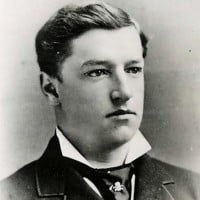 His support for Dollar Diplomacy, a foreign policy approach that sought to further American business interests abroad, has been criticized as an instance of economic corruption. Critics argue that this policy placed the interests of American corporations above those of foreign nations and the global community.
His support for Dollar Diplomacy, a foreign policy approach that sought to further American business interests abroad, has been criticized as an instance of economic corruption. Critics argue that this policy placed the interests of American corporations above those of foreign nations and the global community. Before Biden's term, this administration was historically seen as the most corrupt of all.
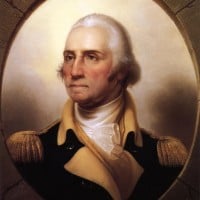 While his personal integrity is often lauded, the Whiskey Rebellion during his presidency was a contentious point. His use of military force to quell this protest against a tax policy was seen by critics as a potential abuse of power and a breach of the democratic principle of peaceful protest.
While his personal integrity is often lauded, the Whiskey Rebellion during his presidency was a contentious point. His use of military force to quell this protest against a tax policy was seen by critics as a potential abuse of power and a breach of the democratic principle of peaceful protest. He was a supporter and president in charge of the Slave Trade. Not only did the Slave Trade hurt the Africans, but it also hurt the churches.
Father of the nation leads to father of enslavement.
 His role in the War of 1812, which critics argue was prompted by American territorial ambitions rather than genuine security threats, has been viewed as a form of political corruption. The destruction and loss of life during this war raised questions about Madison's decision-making and the motives behind it.
His role in the War of 1812, which critics argue was prompted by American territorial ambitions rather than genuine security threats, has been viewed as a form of political corruption. The destruction and loss of life during this war raised questions about Madison's decision-making and the motives behind it.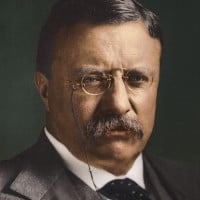 His interventionist policies, often known as Big Stick Diplomacy, have been criticized as a form of political corruption. Critics argue that this approach, which led to the U.S. becoming a global police power, was an overextension of presidential power.
His interventionist policies, often known as Big Stick Diplomacy, have been criticized as a form of political corruption. Critics argue that this approach, which led to the U.S. becoming a global police power, was an overextension of presidential power.